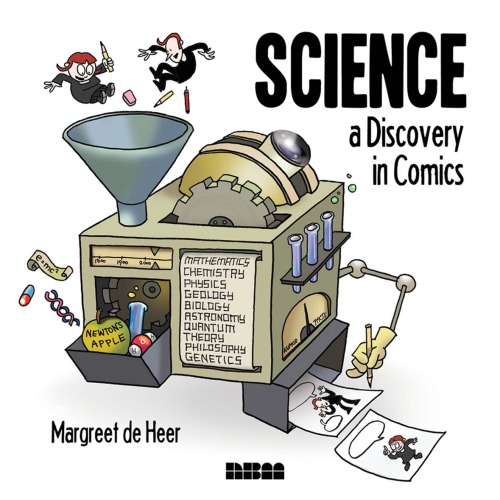
Science
Discovery in Comics
کتاب های مرتبط
- اطلاعات
- نقد و بررسی
- دیدگاه کاربران
نقد و بررسی

November 1, 2013
Gr 9 Up-This history of scientific discovery is presented as a series of conversations about understanding the laws that govern the universe. In this conceptual follow-up to Philosophy: A Discovery in Comics (NBM, 2012), de Heer uses avatars of herself and her husband to create an overview of science from concept to execution. Beginning with the ideals of scientific observation and inquiry, the book moves to detailed chronologies of the evolutions of biology, physics, geology, etc. Much of the information is organized in time-line form, which is used to depict the gradual accumulation and transformation of concepts as well as the chains of thinkers who built upon the work of those who came before. The author acknowledges a Western bias and is not afraid of exploding a few popular myths of reputation, but never in a chiding or judgmental manner. The essential message seems to be that discovery requires work over time and needs to simultaneously build on the past while being open to new, more accurate possibilities. It downplays competitiveness and concentrates on the overall human legacy of thought. The artwork begins simply, with breathing room for comic asides and humanization of the narrators, but becomes increasingly dense as it focuses on specific topics and biographies. Not a quick read, but not a dry one; instead, this is an engrossing catalog of possibilities where readers' fancies can catch and lead to further investigation of a concept or innovator. -Benjamin Russell, Belmont High School, NH
Copyright 2013 School Library Journal, LLC Used with permission.

October 15, 2013
De Heer and her colorist husband, Yiri T. Kohl, proceed with science as they did with philosophy (Philosophy: A Discovery in Comics, 2012). Appearing as cheerfully animated presenters, de Heer and Kohl first define science and identify three kinds of scientists: gatherers (primary researchers), thinkers (theorists), and tinkerers (experimenters). Then they chart the history of science, beginning, despite Kohl's protests about earlier civilizations' accomplishments, with the ancient Greeks and Thales of Miletus, whose quest for a material first principle (water, he concluded) brought him the sobriquet Father of Science. Besides important persons, various scientific disciplinesfrom mathematics to quantum theoryand historical contextsfrom antiquity to the twentieth centuryare covered as they crop up. Although the information on any one topic is very basic, a great many topics are treated, thanks to the economy of de Heer's visual presentation, and they are all handled very well, thanks to the energy of her drawing style and the vividness of Kohl's coloring. If anything, Science is an even more successful, attractive, and engaging work than Philosophy.(Reprinted with permission of Booklist, copyright 2013, American Library Association.)

























دیدگاه کاربران